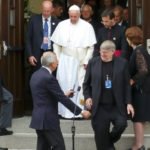Sarah Adams
SAU Theological Perspective

Immediate images that come to mind when one recalls the sacrament of confirmation may be fire, rushing wind, speaking in tongues, perhaps a dove, one’s sponsor or the name of one’s chosen saint. Some may not remember their confirmation or only vaguely recall the experience. Some may think back on their own confirmation fondly and with vivid memories. For some, their reception of the sacrament was a blip on the radar. For others, it may have been a key point in their spiritual journey. Yet, the grace and gifts of the Spirit received by the confirmandi are just as real and efficacious for the person who shows up with doubts and skepticism — or to please their parents — as it is for the person who has a profound or intense spiritual experience.
A theology of confirmation must begin with a theology of the Holy Spirit, as the Holy Spirit is central to the sacrament. The Holy Spirit is often described as a guide, a comforter, an advocate, as mysterious, as spontaneous, as the giver of life. The Spirit always points to community. At Pentecost, the Spirit led the disciples out of the upper room and into the community, where all were able to hear the disciples in their own native languages.
The Spirit creates community while allowing for individuality. As Paul writes, “there are different kinds of spiritual gifts but the same Spirit; there are different forms of service but the same Lord; there are different workings but the same God who produces all of them in everyone” (1 Corinthians 12:4-11). This is precisely what the sacrament of confirmation does as well. In the sacrament, the confirmandi receives the seven gifts of the Holy Spirit: wisdom, understanding, counsel, fortitude, knowledge, piety and fear of the Lord or wonder and awe. The recipient is responsible for using these gifts to nourish, not only themselves, but others.
The Holy Spirit is radical and brings new life. Fittingly, confirmation is one of the three sacraments of initiation, along with baptism and Eucharist. It is a beginning. It was the power of the Holy Spirit that ignited the followers of Jesus in the closed, upper-room to go out and proclaim to everyone. This movement marked a new beginning for the first followers of Christ, and confirmation marks a new beginning for those receiving the sacrament. The recipients are called to be radically moved by the Spirit to also go out and be the face of Christ to everyone.
While confirmation marks a beginning, this does not mean it is one static point. Beginnings necessitate action. Through confirmation, the Spirit draws recipients into solidarity with others and into deeper relationship with themselves and God. Yet, while confirmation is spiritual, it is also embodied. Like all sacraments, confirmation is a visible sign of an invisible grace. This is seen in the symbols of the sacrament: the laying on of hands and anointing with chrism. Through these symbols, the recipients are encouraged to experience, physically, the signal of spiritual grace. Those who receive confirmation can use this sacrament as a framework. Confirmands may ask themselves, how can I express to others corporally the gifts I have received spiritually?
The confirmed “are enriched with a special strength of the Holy Spirit” (CCC, no. 1285 citing “Lumen Gentium”). The Spirit encourages and emboldens us to, like Christ did, serve and stand with the marginalized, the poor, the vulnerable. This is a way in which the spiritual gifts given in confirmation can be expressed in a bodily or corporeal fashion. The gifts of the Holy Spirit, the Lord, the giver of life, are given to the confirmed. The confirmed are called to use these gifts to enrich their own faith as well as to give life to others. As the Gospel of John reveals, Jesus came that we may have life and have it abundantly (John 10:10). So, how can we use the gifts of the Holy Spirit, the giver of life, to give life abundantly to the other?
(Sarah Adams is a student in the Master of Theological Studies program at Saint Louis University from which she plans to graduate in May 2022. She is an alumnus of St. Ambrose University and graduated in 2020 with a B.A. in Theology and Marketing.)











